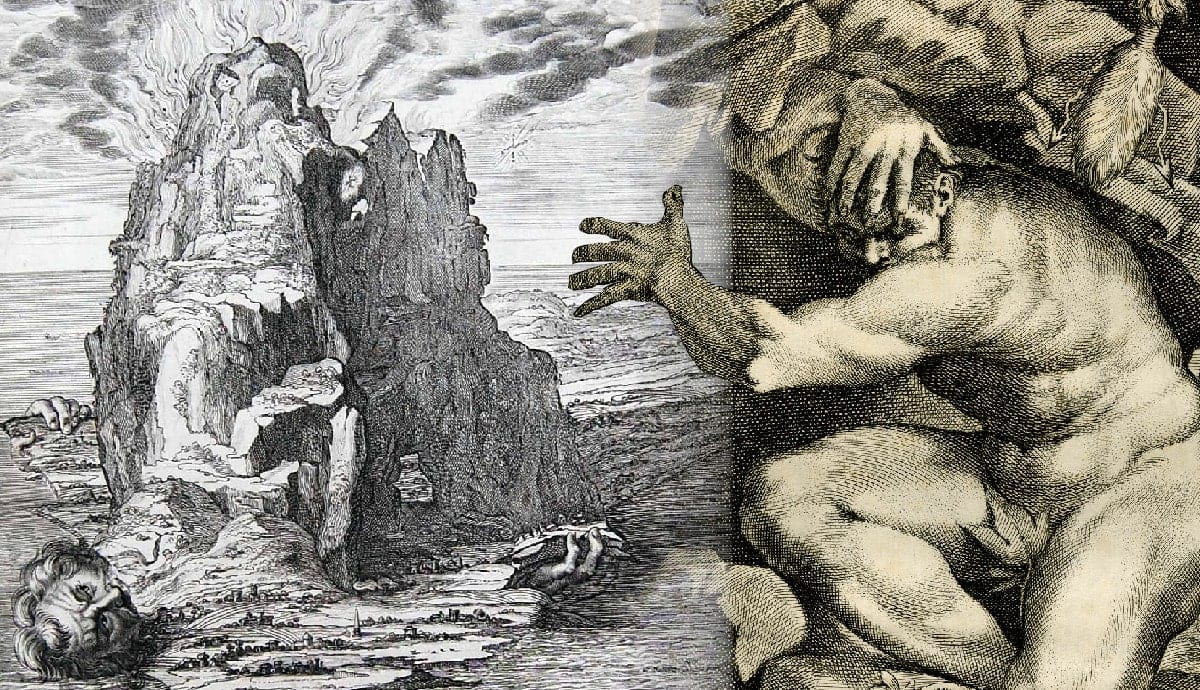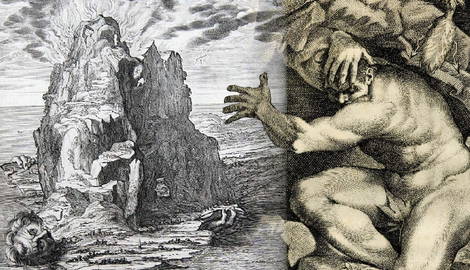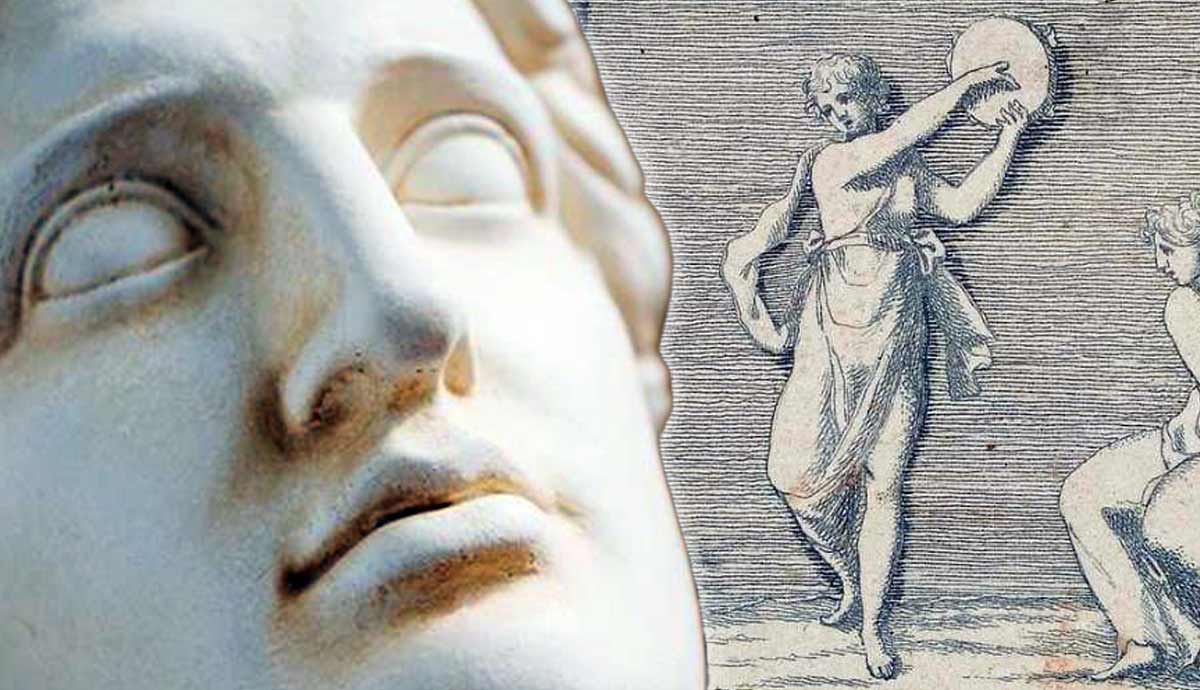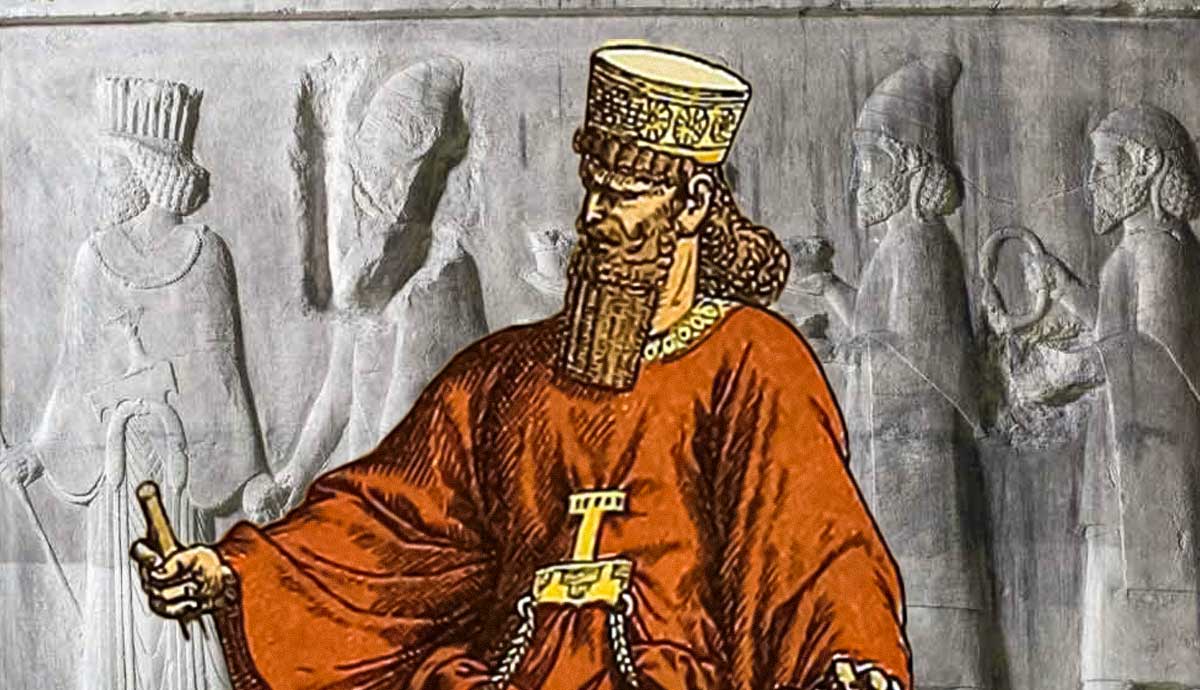
One of the most important episodes in Greek Mythology was the Gigantomachy, the relentless war between Greek Giants and Gods. The Giants proved themselves a powerful adversary that almost dethroned the Olympian Gods. Amongst their leaders was Enceladus, the mighty Giant who made the earth tremble. In the end, Enceladus was trapped under Mount Etna in Sicily, where his movements still cause volcanic activity and earthquakes. Even today, in modern Greece, every time there is a major earthquake, news channels report that “Enceladus has woken up” or that the locals felt “Enceladus’ wrath.”
Who Was Enceladus?

“Enceladus, his body lightning-scarred,
lies prisoned under all, so runs the tale:
o’er him gigantic Aetna breathes in fire
from crack and seam; and if he haply turn
to change his wearied side, Trinacria’s isle
trembles and moans, and thick fumes mantle heaven.”
Virgil, Aeneid 3.570
Enceladus was one of the most, if not the most, powerful Greek giants. He was the son of Tartarus or Uranus (sky) and Gaia (earth) and a terrible immortal being that stood against the Greek gods of Olympus, presenting a serious threat for the divine order during the Gigantomachy, the great war between gods and titans for domination over the universe.
Finally, Enceladus did not manage to overcome his opponents. The gods trapped him under Mount Etna in Sicily, where he remains alive until today, shaking the earth and causing volcanic eruptions.
Gigantomachy

“Up army of avengers…defend your mother. Here are seas and mountains, limbs of my body, but care not for that. Use them as weapons. Never would I hesitate to be a weapon for the destruction of Jove. Go forth and conquer; throw heaven into confusion, tear down the towers of the sky. Let Typhoeus seize the thunderbolt and the sceptre ; Enceladus, rule the sea, and another in place of the sun guide the reins of dawn’s coursers. Porphyrion, wreathe thou thy head with Delphi’s laurel and take Cirrha for thy sanctuary.” Claudian, Gigantomachia 32–33
Although many conflate the Gigantomachy with the Titanomachy, these were two separate events in Greek mythology.
The Titanomachy was a war between Greek Gods and the Titans, which ended with the gods triumphant under Zeus’ command and the titans trapped deep inside the Tartarus. The mother of the Titans, Gaia (earth), could not bear the torture of seeing her children trapped inside the darkest pits of the earth and sought revenge. As a result, she gave birth to the giants, a mighty race of extremely violent immortals. The moment the Giants appeared, they began destroying and challenging the gods’ authority.
The ensuing war was cruel as gods fought with giants in every corner of the earth. According to a prophecy, the gods stood a chance against the titans only with help from a mortal. Gaia sought to shield her children with a specific plant but was unable to find it because Zeus caused the light of the sun and the moon to stop and harvested all of the plants by himself. This way, Gaia’s initial plan failed, and Zeus summoned his legendary demigod child, Hercules.
With Hercules, the gods now had the most powerful mortal on their side. Hercules played a detrimental role in defeating the Giants. As the prophecy had foretold, for every giant hit by Zeus’ lighting, Hercules would shoot one of his arrows. Apparently, without this, victory would have been impossible. However, there are a few exceptions here as not all Giants were hit by Hercules’ arrows, and one of them was Enceladus.
The Myth Of Enceladus

Enceladus was not simply one of the Greek Giants; he was one of the most powerful if not the most powerful of his race. Although ancient authors disagree on who was the king of the giants, Claudian calls Enceladus the “all-powerful king of the Earth-born giants.”
However, in another of his texts, Claudian suggested that should the Giants win, Typhoeus would take Zeus’ place on Olympus and Enceladus Poseidon’s in the ocean.
In any case, it is evident that Enceladus was one of the most important of his race and was considered a serious threat to the reign of the Olympian Gods.
Who Defeated Enceladus?

An issue with the Gigantomachy is that the myth’s sources are scarce. In addition, more often than not, ancient authors disagree with each other. As a result, there are multiple gods who are said to have defeated Enceladus. Let’s take a closer look at them.
Dionysus And Zeus

Bacchus raised himself and lifted his fighting torch over the heads of his adversaries, and roasted the Giants’ bodies with a great conflagration, an image on earth of the thunderbolt cast by Zeus. The torches blazed: fire was rolling all over the head of Enceladus and making the air hot, but it did not vanquish him — Encelados bent not his knee in the steam of the earthly fire, since he was reserved for a thunderbolt. Nonnus, Dionysiaca 48.49
Nonnus, who wrote the Dionysaica, presents Dionysus throwing fire at Enceladus with little success. Finally, Zeus is the one who overcomes Enceladus’ aggressiveness with his thunder. In this version, the combination of Dionysus’ fire and Zeus’ thunder roast the Giants and silence Enceladus.

Although no one else agrees with Nonnus’ version, many other authors agreed that Zeus was the one who defeated the mighty Greek giant. In Virgil’s Aeneid, Enceladus’ body is described as “lightning-scarred” after being hit by Zeus’ divine weapon, the thunder.
Silenus

In Euripides’ Cyclops, Silenus, the follower and foster father of Dionysus, is the one who defeats Enceladus:
“Silenus: I took my stand protecting your right flank with my shield and, striking Enceladus with my spear in the center of his targe, killed him.”
This has to be a satiric take on the classical myth by Euripides. Silenus, a drunkard wine-god, killing one of the most powerful Giants seems absurd. In fact, it is so absurd that even Silenus appears to have a hard time believing it:
“Come, let me see, did I see this in a dream? No, by Zeus, for I also displayed the spoils to Dionysus.”
Athena

In another work of Euripides, Ion, the poet presents the traditional version of the myth with Athena brandishing her spear against Enceladus. This more standard version of Enceladus’ myth has a long history that can be traced back to the 6th century and a vase painting depicting the fight between Athena and the Greek giant.
The rivalry between the two is a common locus in every version of the myth. Even in Nonnus’ version, where the Giant is defeated by Dionysus and Zeus’ combined forces, Enceladus is motivated to fight in order to receive Athena as his wife. Here it is important to remember that Athena was a goddess known for being a virgin. In fact, she was the protectress of virginity, and as such, it would be inconceivable for her to marry. Enceladus’ hope to take her as his bride was the same as him proclaiming that he will rape her. As such, the ancient reader would have considered as completely outrageous the idea of a giant marrying the goddess.
Furthermore, Apollodorus, the Greek mythographer, writes that after the other giants were killed by Hercules’s arrows and Zeus’ thunder, Enceladus fled. At that moment, Athena raised the island of Sicily and buried Enceladus under it.
Pausanias, a Greek travel writer of the 2nd century CE, recorded another take on the myth in which Athena throws her chariot to Enceladus:
“According to their account, when the battle of the gods and giants took place the goddess drove the chariot and horses against Enceladus.” (Description of Greece 8.47.1)
Enceladus Was Buried Under Sicily

“…the mount Aetna smolders with fire and all its secret depths are shaken as the giant under the earth, shifts to his other shoulder.” Callimachus
The Greek giants all met different ends, but Enceladus’ was one of the most creative and, at the same time, terrifying. In almost every single one of the many versions of Enceladus’ myth, the giant ends up buried. Apollodorus has him buried under the island of Sicily while Virgil and Claudian under the mountain Etna, also in Sicily.
As an immortal, Enceladus remains alive, suffering under the Etna. His movement and rage cause Etna to erupt, bringing fire and destruction to its surrounding area. Over the centuries, Enceladus keeps roaring and causing trouble. Even today, the Greek Giant is restless, as volcanic activity keeps worrying the area’s inhabitants. It was due to this aspect of his myth that Enceladus became a deity related to volcanic activity and earthquakes.
Worth noting is that in ancient Greece, it was a common belief the earth was floating on the ocean. This idea can be traced as far back as to Thales of Miletus. At the beginning of the Gigantomachy, Enceladus was promised Poseidon’s realm should the Giants win. This realm was none other than the ocean. Besides, ancient Greek mythology attributed the title earth-shaker to Poseidon. Although his authority was far greater than Enceladus,’ Poseidon was also seen as the god behind all earthquakes, a phenomenon that was, and still remains, quite common in the Eastern Mediterranean. Consequently, since Enceladus was trapped under an island, there was a clear connection between his earthquake powers and the ocean.










